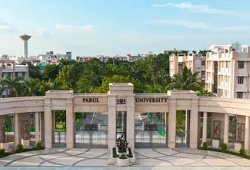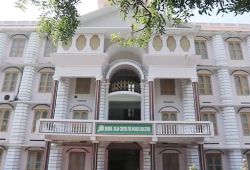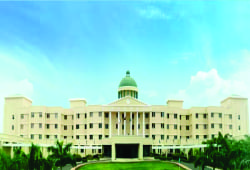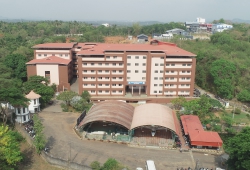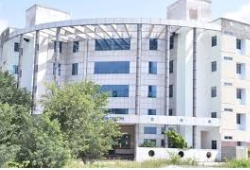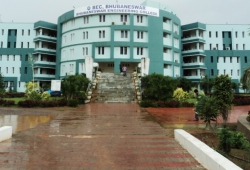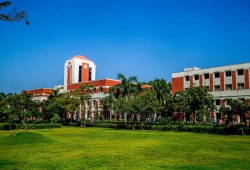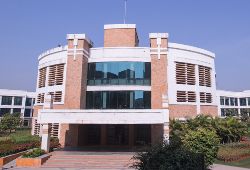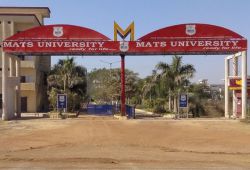
Aeronautical Engineering Colleges in Mumbai
Mumbai serves as a vibrant west coast location which provides a dynamic environment for Aeronautical Engineering education in India. Engineers who dream of pursuing their studies choose this dynamic city because it offers them a flourishing academic environment along with leading aerospace programs. Students enrolled in Aeronautical Engineering colleges throughout Mumbai pursue aerospace system education through physics and mathematics while solving problems through research and industry-scene work. The energetic pulse of Mumbai brings aspiring aerospace engineers academic advancement alongside supportive innovation in one of the most exciting fields of engineering.
Aeronautical Engineering Colleges Fees in Mumbai
The cost of pursuing an undergraduate or graduate degree in aeronautical engineering in Mumbai can vary depending on the college or university and other variables. It is essential to check the specifics with each college. Here is a summary in general:
Government Institutions
In India, public universities typically charge less for programs in aeronautical engineering in mumbai than private universities. Government universities charge annual tuition for undergraduate programs that can range from about INR 20,000 to INR 40,000.
Private Institutions
Tuition at private engineering colleges and universities is frequently more expensive. Private institutions charge a wide range of fees for aeronautical engineering in mumbai, from about INR 70,000 to INR 1,50,000 or more annually.
Scholarships and Financial Aid
The pathway to financial relief for students includes searching through different scholarship opportunities together with funding programs. The paths for securing financial support during your aeronautical engineering education include merit-based scholarships together with government grants combined with educational loans. The available financial aids will decrease substantially the costs that students need to pay out of their pocket for their aeronautical engineering education.
Additional Costs to Consider
While tuition fees are a substantial part of the expense, it's important to factor in some additional costs:
- Hostel and Accommodation: Accommodation costs must be taken into account if you are moving to Mumbai to study after leaving another city or state.
- Study Materials: Your education would not be the same without books, lab manuals, and other study aids.
- Transportation: Depending on where you live, transportation to and from the campus may incur additional costs.
- Extracurricular Activities: Participating in workshops, attending seminars, and joining clubs can all improve your learning, but there may be expenses involved.
Eligibility Criteria for Aeronautical Engineering Colleges in Mumbai
To become an aeronautical engineer, certain requirements must be fulfilled. We'll describe the requirements for potential students studying aeronautical engineering in this post. The following prerequisites must be fulfilled in order to gain admission to a prominent Mumbai aeronautical engineering college:
- Academic Qualifications: Successful completion of the 10+2 examination with a strong foundation in Physics, Chemistry, and Mathematics.
- Entrance Examinations: Applicants need to obtain passing marks in entrance exams JEE Main, JEE Advanced, AME CET or state-level engineering test series for entrance.
- Minimum Aggregate Marks: Students need to achieve minimum earning scores of at least 50 % alongside their qualifying test results.
- Additional Entrance Exams: Additional entrance exams exist which specific colleges require their candidates to pass before admission.
- Age and Nationality: Authentication of eligibility often involves limitations pertaining to age or nationality varying between colleges.
Aeronautical Engineering Colleges Campus Facilities in Mumbai
Numerous esteemed educational establishments, including colleges that provide Aeronautical Engineering programs, can be found in Mumbai, the financial and entertainment hub of India. An outline of the standard facilities offered by Mumbai's aeronautical engineering colleges is provided below:
- Cutting-Edge Laboratories: The new laboratories provide complete facilities to introduce academic programs focused on aviation technology using wind tunnels and material-testing alongside flight-simulation devices.
- Aircraft Maintenance Hangars: Students have access to aircraft maintenance and repair facilities located on the college grounds.
- Rich Library Resources: Students can use the well-stocked libraries that contain many books and research papers and online resources to perform research and learn more things.
- Aviation Workshops: The workshops possess aircraft component fabrication equipment that provides students with invaluable insights about aircraft engineering practice.
- Computer Labs: Every computer lab at the educational institution provides students with software packages that combine aerodynamic simulation systems and engineering project applications to utilize technological capabilities in their studies.
- Interactive Classrooms: Modern classrooms designed to facilitate interactive learning through the use of audio-visual aids, enhancing the educational experience.
- Research Centers: The institution promotes aerospace cutting-edge research while giving students chances to conduct innovative projects.
- Hostel Facilities: The housing facilities located on campus offer students both security and practicality while helping to build group bonds among students.
- Sports and Recreation: Students find holistic wellness through their use of gym facilities and sports areas and cultural club activities that combine exercise with mental health benefits.
Admission Process in Aeronautical Engineering Colleges in Mumbai
The aeronautical engineering colleges in Mumbai follow a consistent admissions process. This section will walk you through the requirements and necessary steps. The AME CET admissions procedure at Mumbai's aeronautical engineering colleges consists of the following steps:
- Application: Future enrollees need to begin by filling the AME CET application form while supplying the essential information.
- Entrance Exam: All candidates need to take the AME CET exam to demonstrate their aircraft maintenance engineering knowledge and intellectual capacity.
- Counseling: The process begins with result declaration for AME CET which leads to an invitation for eligible candidates to join counseling sessions. The counseling events allow students to pick their college options and courses by using their gained positions in the AME CET and considering the available seats.
- Document Verification: Must present several crucial documents related to their education and AME CET exam with their identification proofs during the counseling session.
- Seat Allotment: The AME CET exam determines both merit and candidate preferences that colleges use to assign available seats.
- Fee Payment: To confirm enrollment at their selected college students must submit relevant charges.
- Reporting to College: Students who gain admission through the AME CET program need to attend their selected colleges on a specified day to finalize administrative procedures before starting their aeronautical engineering curriculum.
Aeronautical Engineering Entrance Exam in India
Entrance exams for aeronautical engineering are essential for evaluating prospective students' abilities, knowledge, and skills. These exams are necessary for admission to many Indian colleges and universities' aeronautical engineering programs. The following well-liked entrance exams are accepted for admission to aeronautical engineering programs:
- Joint Entrance Examination (JEE) Main: TheThe JEE Main evaluates student performance in Physics and Chemistry and Mathematics on a national standards. JEE Main scores are taken into account for admission to many esteemed engineering colleges, including those in mumbai.
- Joint Entrance Examination (JEE) Advanced: After passing JEE Main the subsequent requirement leads to JEE Advanced. Candidates usually take this examination for Indian Institutes of Technology (IITs) which contain aeronautical engineering programs among their offerings.
- Aircraft Maintenance Engineering Common Entrance Test (AME CET): The AME CET functions exclusively for aircraft maintenance engineering enrollment since this field represents a close match to aeronautical engineering. The admission criteria find acceptance in aircraft maintenance engineering colleges located throughout mumbai as well as across India.
- State-Level Engineering Entrance Exams: Different states across India organize their engineering admission tests to let students enter state-level aeronautical programs through examination results.
Specializations in Aeronautical Engineering
Aeronautical Engineering, as a multidisciplinary field, offers various specializations that allow students to focus on specific areas of interest and expertise. These specializations can vary depending on the Aeronautical Engineering program and the institution. Here are some common specializations in Aeronautical Engineering:
- Aircraft Design and Manufacturing: This specialization focuses on the creation of aircraft, covering aspects like aerodynamics, structural design, materials, and manufacturing processes. Students gain expertise in designing efficient and safe aircraft.
- Aerospace Propulsion: Aerospace propulsion deals with aircraft engines, rockets, and propulsion systems. Students learn the principles of propulsion, engine design, and the mechanics of flight.
- Avionics and Control Systems: Avionics is all about the electronic systems on board aircraft, including communication, navigation, and flight control. This specialization delves into the technology that keeps aircraft safe and efficient.
- Aircraft Maintenance and Repair: Professional degree holders in this specialization conduct aircraft maintenance while inspecting and repairing aircraft. The training develops aircraft professionals who maintain absolute expertise in aircraft safety standards to become essential contributors within the aviation sector.
- Space Technology and Exploration: With the increasing interest in space exploration, this specialization delves into spacecraft design, satellite technology, and space mission planning. Taking on projects for satellites in addition to space missions and interplanetary exploration is something students often find themselves working on at this field.
- Aeronautical Research and Development: This specialization directs its focus toward new research advances within the field of aeronautics for individuals who want to research. Students work on assignments which extend aerospace technology limits.
- Unmanned Aerial Vehicles (UAVs) and Drones: The recent industry development of UAVs and drones led to the creation of this specialization where students learn about designing and operating unmanned aerial vehicles for surveillance and delivery and data collection purposes.
- Aerospace Management: Students who want to work in aviation business operations should choose aerospace management. Students learning about aviation operations and airline management and aviation marketing study this specialization.
Top Recruiters for Aeronautical Engineering Graduates in Mumbai
Graduates of aeronautical engineering programs can find employment in a variety of fields, such as engineering, aviation, and defense, in Mumbai, one of India's largest cities. The following are some possible employers in Mumbai for graduates in aeronautical engineering:
- Indian Space Research Organization (ISRO): Offers career opportunities in satellite development, rocket propulsion, and space exploration projects.
- Hindustan Aeronautics Limited (HAL): A major aerospace brand selects aeronautical engineers to work in aircraft and helicopter design activities.
- Defense Research and Development Organization (DRDO): The organization uses their employees in defense technology development to produce missiles alongside creating avionics systems.
- Bharat Heavy Electricals Limited (BHEL): The company employs aeronautical engineers for gas turbine equipment development that powers electricity generation systems.
- National Aeronautics Laboratory (NAL): The organization dedicates its research to aerospace fields because their experts enhance aircraft design through wind tunnel evaluations and study aerodynamic phenomena.
- Air India: The national carrier utilizes aeronautical engineers to maintain aircraft for their brief safety operations.
- Private Aerospace Companies: Tata Advanced Systems along with L&T and Mahindra Aerospace enable candidates to find various aerospace technology and manufacturing positions.
- Aviation Companies: The airline companies IndiGo, SpiceJet and Vistara recruit aeronautical engineers to perform tasks regarding aircraft maintenance and aviation security.
- Research and Development Centers: Graduates of aeronautical engineering can perform leading research projects at academic institutions and research facilities along with independent research organizations.
- Consulting and Engineering Firms: Wipro together with TCS and Infosys maintain aerospace divisions through which they provide engineering solutions to aviation and aerospace industry operations.
Aeronautical Engineering Syllabus
Aeronautical Engineering programs in India typically follow a structured curriculum organized by year and semester. Here's a year-wise and semester-wise breakdown of a typical Aeronautical Engineering syllabus in India:
Ist Year:
Semester 1:
- Engineering Mathematics - I
- Engineering Physics
- Engineering Chemistry
- Basic Electrical and Electronics Engineering
- Engineering Mechanics
- Engineering Drawing
- Workshop Practice
Semester 2:
- Engineering Mathematics - II
- Engineering Materials
- Computer Programming and IT
- Engineering Thermodynamics
- Engineering Mechanics of Solids
- Communication Skills
IInd Year:
Semester 3:
- Mathematics - III
- Fluid Mechanics
- Introduction to Aeronautical Engineering
- Aircraft Systems and Instruments
- Aerospace Structures - I
- Materials Science
- Computer-Aided Design (CAD)
Semester 4:
- Numerical Analysis and Methods
- Aerodynamics - I
- Aircraft Propulsion - I
- Aerospace Structures - II
- Control Engineering
- Electrical Circuits
- Environmental Studies (Elective)
IIIrd Year:
Semester 5:
- Aerodynamics - II
- Aircraft Propulsion - II
- Aircraft Design and Performance
- Flight Mechanics and Control - I
- Aerospace Materials and Manufacturing
- Instrumentation and Control Systems
Semester 6:
- Aircraft Stability and Control - I
- Aircraft Maintenance and Repair
- Aircraft Systems Integration
- Heat Transfer
- Avionics and Navigation Systems
- Project Work - I
IVth Year:
Semester 7:
- Flight Mechanics and Control - II
- Aircraft Stability and Control - II
- Space Technology and Rocket Propulsion
- Aircraft Systems Engineering
- Aircraft and Rocket Propulsion Systems
- Aircraft Design - I
Semester 8:
- Avionics and Communication Systems
- Aerospace Instrumentation
- Aircraft Design - II
- Project Work - II
- Elective Courses (Specializations)
Elective Courses (Specializations): In the final year, students have the option to select elective courses based on their interests and career goals. Specializations may include space technology, aircraft design and manufacturing, avionics and control systems, propulsion systems, and more.
Aeronautical Engineering Course Duration in Mumbai
The course duration for Aeronautical Engineering programs at colleges in Mumbai, as with most undergraduate engineering programs in India, typically follows a four-year duration. Here's an outline of the course duration:
Bachelor of Technology (B. Tech) in Aeronautical Engineering:
- The undergraduate Aeronautical Engineering program, leading to a B. Tech degree, usually spans four years.
- This four-year duration is divided into eight semesters, with each semester typically lasting for about six months.0
- Students will go through a structured curriculum that covers fundamental engineering principles, core Aeronautical Engineering subjects, elective courses, and practical training.
The four-year B. Tech program provides students with a well-rounded education in Aeronautical Engineering, including theoretical knowledge and hands-on experience. It covers subjects such as aerodynamics, flight mechanics, propulsion systems, aerospace materials, aircraft design, space technology, and more.



